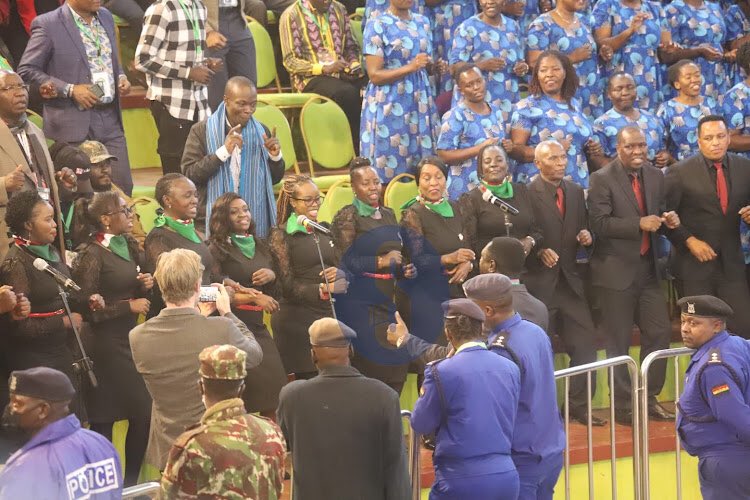
Ex-IEBC Chair Wafula Chebukati critically ill
Chebukati is said to be admitted to the ICU.
Chebukati died on Thursday night while undergoing treatment at a Nairobi hospital.
In Summary

For the first time in Kenya’s history, the setup for announcing the 2022 Presidential election results at Bomas of Kenya was unlike before.
Former IEBC chairperson Wafula Chebukati—who died on Thursday night—and the secretariat blended the otherwise procedural and legal affair with elements of religion, as invited choirs passionately sang.
A gathering of clergy was present, offering reassurance that God was in control while also boosting Chebukati’s morale.
Like the proverbial simian clinging to a tree amid a raging storm, trusting that the trunk would not fail, the choir at Bomas heroically endured the tension-filled atmosphere.
On August 15,
millions of Kenyans and international observers were glued to their screens,
anxiously awaiting the declaration of a winner in the historic presidential
election.
Dressed in black and white with elements of green and red—colours of the Kenyan flag—the singers harmonised in unison, perhaps to reassure Kenyans that all would be well.
As the scheduled announcement time passed by a significant margin, the choir, well-prepared for the long wait, simply pulled another song from their vast repertoire to ease the growing tension.
After more than two hours of delay, patience began to wear thin.
When leaders from the Azimio-One Kenya Coalition started moving in and out of the hall, it became apparent that something was happening behind the scenes—something not everyone was privy to.
Not long after, a scuffle broke out. Physical altercations ensued, and before the police could restore order, chairs were hurled, and the wooden lectern bearing the IEBC seal was thrown from the stage, breaking in two.
At first, politicians from both sides maintained cordiality, suggesting a readiness to accept the election results.
They sang and danced along to patriotic songs resonating through the packed hall, smiling as they awaited the announcement. However, this calm did not last.
The lectern was the first casualty, followed by chairs and tables as disorder spread.
As Bomas of Kenya descended into turmoil, security officers quickly moved to protect Chebukati, commissioners Boya Molu and Abdi Guliye, and IEBC chief executive Marjan Hussein.
The other four
commissioners—former vice chair Juliana Cherera, Francis Wanderi, Justus
Nyang'aya, and Irene Masit—had already left the venue minutes before the final
announcement, citing disagreements with Chebukati.
Amidst the chaos that threatened to overshadow the democratic process, the choir remained steadfast.
The tension escalated when Narok Senator Ledama Ole Kina and Azimio la Umoja’s chief agent, Kanchory, approached the dais, where Chebukati, IEBC CEO Hussein Marjan, and commissioners Molu and Guliye had just taken their seats.
They were confronted by Orengo, Ole Kina, and Saitabao, who shouted at Chebukati. Diplomats and international election observers were quickly escorted out of the tallying hall.
Security officers attempted to de-escalate the situation, but more Azimio supporters forced their way onto the stage.
Homa Bay Governor-elect Gladys Wanga led the charge, climbing over tables and chairs in an attempt to reach Chebukati and the commissioners.
The melee forced Chebukati to flee for safety, while his commissioners and staff suffered injuries.
Ole Kina threw away the microphone as others vandalized the podium, tossing the lectern and chairs from the dais onto the auditorium floor.
Despite the chilling atmosphere and looming uncertainty, the choir continued singing, much like a lighthouse guiding a ship through treacherous waters.
“Twapenda amani, twapenda undugu ulio hapa Kenya. Ni muhimu sisi wananchi tuilinde umoja wetu,” they sang—patriotic lyrics that restored hope amid the chaos.
The police, who played a critical role that day, eventually restored order.
The nation held its breath, awaiting the final outcome. Moments later, a visibly shaken Chebukati emerged to announce the presidential election results.
He noted that two of his colleagues had been injured in the melee and were receiving treatment. On his second attempt, the long-anticipated announcement was finally made.
Flanked by security officers, Chebukati took to the podium as the audience applauded. In a brief speech, he declared UDA candidate William Ruto as President-elect and Rigathi Gachagua as Deputy President-elect.
This pronouncement was immediately disputed by Raila Odinga and the Azimio coalition, who alleged malpractice in the tallying process.
Four IEBC commissioners distanced themselves from the final tally, citing a lack of transparency.
Earlier that day, before Chebukati’s announcement, tension was already brewing at Bomas.
Azimio la Umoja leaders, who had arrived at the national tallying center, left their seats and held a press conference outside the auditorium.
They alleged that the process had been compromised and that
they would not accept the results. They claimed they had been unable to reach
Chebukati to express their concerns about vote tallying.
Raila’s chief agent, Saitabao ole Kanchory, along with other Azimio leaders such as James Orengo and Anyang’ Nyong’o, demanded to see and verify the presidential results before advising Raila to proceed to Bomas for the official announcement.
In a press conference, Saitabao stated that the Azimio coalition had yet to receive Form 34C, which contained the final election results.
He accused Chebukati of avoiding Azimio agents and remaining silent amid widespread electoral irregularities.
The leaders later dispersed, preparing for Chebukati’s
address, which was initially scheduled for 3 PM but was eventually delayed to
just before 6 PM.

Chebukati is said to be admitted to the ICU.

Chebukati had been admitted to a hospital in Nairobi for nearly a week.

Chebukati died on Thursday night.